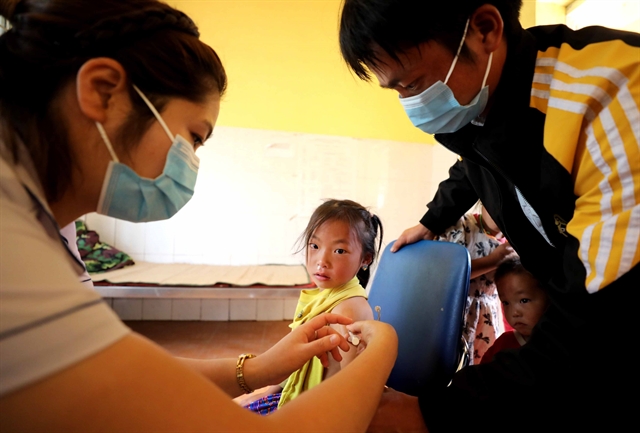 Society
Society

 |
| A child in Lai Châu Province is vaccinated against COVID-19. The rapid and universal roll-out of vaccines has enabled life to return to normal and reduced pressure on hospitals, clinics and schools, according to the UNDP. — VNA/VNS Photo |
HÀ NỘI — Việt Nam's Human Development Index (HDI) value of 0.703 in 2021 remained essentially unchanged from 2019 (0.704), though the nation did climb two places in the global rankings, from 117 to 115.
Việt Nam managed to sustain economic growth during the most difficult years of the pandemic, according to the UN Development Programme (UNDP) in Việt Nam.
At yesterday's launch of the global 2021/22 Human Development Report (HDR), "Uncertain Times, Unsettled Lives: Shaping our Future in a Transforming World", UNDP in Việt Nam reported the country's Gender Inequality Index, which measures the loss of human development due to inequality between males and females, continued to improve in 2021.
The country's Global Innovation Index (GII) (considered reproductive health, empowerment and labour force participation) was 0.296, ranking 71 out of 170 countries.
The country performed well in terms of maternal mortality, education of girls and female labour force participation, but the representation of women in the parliament remains low.
Concerning PHDI, which discounts the HDI for pressures on the planet, Việt Nam is only deducted by 5.8 per cent due to carbon dioxide emissions and material consumption per capita.
However, Việt Nam's small deduction does not mean that the country has done well in reducing CO2 emissions, just that Việt Nam does not have many industries emitting this gas compared to others, according to UNDP in the country's report yesterday.
"Looking ahead, Việt Nam is well placed to regain the loss of momentum resulting from COVID-19 and manage the uncertainties associated with the cascading crises described in the HDR," said Professor Jonathan Pincus, UNDP Senior Economist, at the launch in Hà Nội.
"The rapid and universal roll-out of vaccines has enabled life to return to normal and reduced pressure on hospitals, clinics and schools. Government policy has been flexible and adaptive, which has made it possible for industries like tourism and transport to post an impressive recovery in 2022."
UNDP also noted that there would be many challenges for Việt Nam in the coming time. Climate change is the biggest, and economic development depends on rising prices worldwide.
Three issues, investment, insurance and innovation, are recommended by UNDP experts for the country's development in the current period.
Jonathan Pincus said that increasing investment in infrastructure, education, training and research increases national resilience and capacity to adjust quickly and flexibly to changing global conditions.
Việt Nam's social protection system must help all citizens to manage economic and natural disaster risks and sustain living standards even during difficult times.
The theme of this year's report is the multiple crises facing the world and our collective capacity to mitigate their impact on human development.
HDI declined globally for two years in a row, the first time in the 32-year history of the index.
Over 90 per cent of countries registered HDI declines either in 2020 or 2021. More than 40 per cent decline in both years, signalling that the crisis is still deepening for many. — VNS

.jpg)


